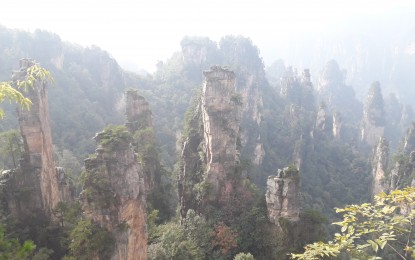
'AVATAR MOUNTAIN'. Part of the Hallelujah Mountains in Zhangjiajie, Hunan Province where the American film Avatar was filmed. (PNA Photo by Kris Crismundo)
BEIJING – With the upcoming celebration of the 70th anniversary of the People’s Republic of China, its Ministry of Foreign Affairs presented Hunan Province as a significant part of China’s development.
In his speech here Thursday, Chinese Foreign Minister Wang Yi said Hunan has embodied reform and is opening up -- being the cradle of the Chinese revolution -- while its economic growth has helped its people to get out of poverty.
Hunan is the birthplace of Mao Zedong, the founder of the Communist Party of China (CPC).
“Hunan is the epitome of reform and opening up. For decades, China has implemented innovation to lead the strategy of opening up and rising to the top in an effort to create a new frontier of opening up,” Wang said in Chinese.
Wang said Hunan also embraces innovation to propel its local economy.
“The economy of Hunan is nearly 40 times as large as it was at the beginning of the reform and opening up,” he added.
According to the Secretary of the Hunan Province Committee of the CPC Du Jiahao, Hunan continues to invite companies in high-tech industries including those in the Fortune 500 to locate their businesses in the province as it bid to eliminate poverty by 2020.
During the presentation and promotion of Hunan, Philippine Ambassador to China Jose Santiago Sta. Romana also shared his experiences in the province.
Sta. Romana recalled that it was in the 1970s when he first visited Hunan as part of Philippine youth delegation visiting in China. He was able to visit the province in 1980s and 1990s as a foreign journalist.
Last year, the envoy had the chance to go back to Hunan for ASEAN-China meeting and foreign ministry consultations between the Philippines and China.
“Upon my return this time, I witness the place almost completely transformed by modern skyscrapers and sprawling highways,” Sta. Romana said.
“Hunan’s vivid past propels it into the future. It is a future where the Philippines sees itself,” he added.
He also mentioned that Hunan and the province of Bulacan in the Philippines signed a sister province agreement last year, which will help in strengthening the ties between the Philippines and China.
Both provinces are home to heroes that shaped the history of the two nations. Likewise, both provinces’ agriculture sector also places great importance on rice.
“Rice which is ingrained in the tradition of the Philippines and of Hunan also shapes the direction of Philippines-Hunan cooperation,” said Sta. Romana.
Moreover, Changsha is now connected through sea and air routes, improving trade and tourism ties between the Philippines and the central part of China.
“This rapid development in the Philippines-Hunan relations are driven by the political will and the personal friendship and camaraderie between the Philippine President Rodrigo Roa Duterte and President Xi Jinping,” the envoy said. (PNA)
